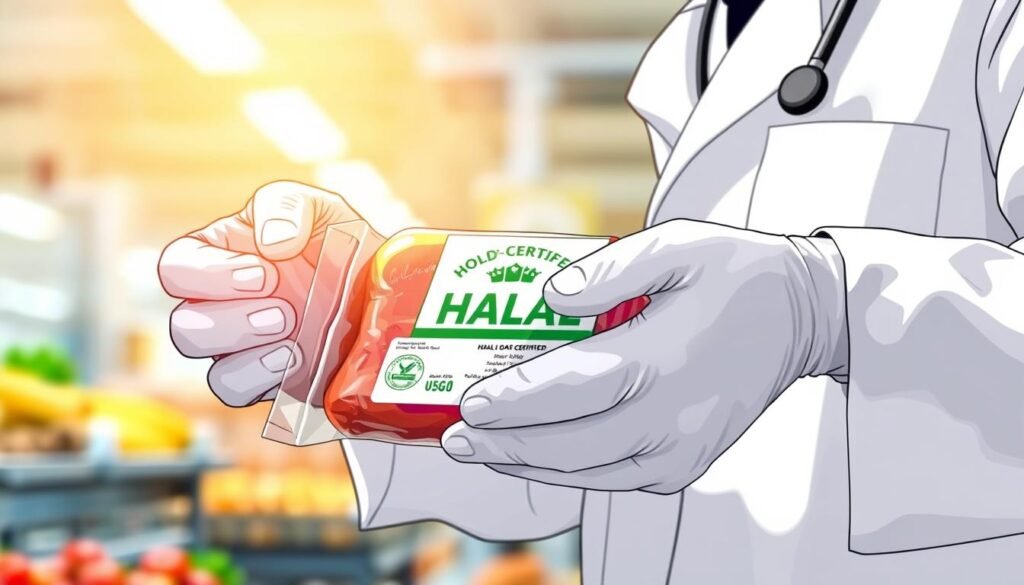Imagine driving three hours to a Chick-fil-A for a simple chicken sandwich. Many Muslims did this during events like ICNA in Baltimore (2015) and ISNA in Houston (2018). They weren’t just craving crispy chicken. They wanted to know for sure if Chick-fil-A was halal.
For years, we’ve been trying to figure this out. Chick-fil-A has nearly 3,000 locations across the country. But their supply chain is a mystery. They share chicken vendors and tools, but don’t have halal certification.
Islamic rules require clear information about food. But Chick-fil-A’s practices are different everywhere. This article will explore the facts. We’ll look at three halal vendors, confirmations from 2018, and ongoing petitions. Is it worth the risk? Let’s explore together.
Understanding Halal Dietary Requirements in Islam
Islamic dietary laws tell Muslims what food is okay to eat. These rules say what is halal and what is haram. This helps people make good choices when eating today.
Halal means “lawful.” Food must follow the Quran and be fair. This is very important in Islam.
“Eat of the good things which We have provided to you…” (Quran 2:172)
What Makes Food Halal or Haram?
Meat must be halal. This means it’s slaughtered by a Muslim with a sharp knife, saying Allah’s name. Animals not slaughtered this way are haram.
Pork, alcohol, and bad slaughter make food haram. Even touching these can make food not halal. For example, fryers in fast-food places can mix haram with vegetarian food.
The Importance of Halal Certification
Certification shows food follows Islamic laws. Without it, it’s hard to know if food is right. Groups check suppliers to make sure animals are okay and people are qualified.
Fast-food sales show why knowing this is important. Over 200 billion dollars is spent in the U.S. each year.
Common Misconceptions About Halal Food
Some think vegetarian food is always halal. But, fryers and ingredients can have haram stuff. Halal rules are not just for meat.
Even salads or fries can have haram stuff. The only way to be sure is with certification.
Chick-fil-A’s Meat Sourcing and Preparation Methods
Chick-fil-A’s chicken is key to its halal status. The company buys chicken from four suppliers. Three of these suppliers follow halal standards, but there’s no way to tell which batches are halal.
“We don’t track which chickens are halal”—a branch manager said this. It shows a big problem. Even though some suppliers follow halal rules, mixing batches makes it hard to know for sure.
Chick-fil-A uses a lot of enriched bleached flour and soybean oil. But, things like rennet in cheese or artificial flavorings might not be halal. There’s also a risk of cross-contamination in shared fryers and prep areas.
Over 2,600 Chick-fil-A locations serve these mixed ingredients every day. Unlike McDonald’s UK, Chick-fil-A doesn’t have clear halal certification. This leaves customers wondering if they can trust what they’re eating.
Can Muslims Eat Chick-fil-A? Examining the Evidence
Many wonder if halal food includes Chick-fil-A. Chick-fil-A’s chicken comes from both halal and non-halal sources. This means each store decides what to serve, making it hard to follow Islamic rules.
Looking at Chick-fil-A’s ingredients shows hidden dangers. Their chicken seasoning seems okay, but some additives might come from pork or alcohol. This is a big problem under Islamic rules.

Imam Nawawi’s fatwa clarifies: “Doubt about slaughter validity invalidates permissibility.”
Some say Chick-fil-A uses halal suppliers at certain places. But without a company-wide seal of approval, these stories are hard to trust. Experts say even if Chick-fil-A ingredients seem fine, the lack of clear sources is a big issue. For true halal food, we need to know where it comes from and have proof.
The Absence of Halal Certification at Chick-fil-A
I’ve talked to muslim consumers who wonder why Chick-fil-A doesn’t have halal certification. It’s about business strategy and not being clear. With over 2,900 places across the country, they aim to please everyone. But, they don’t meet halal standards.
Their silence on how they slaughter animals or the halal certification process steps is confusing. This makes it hard for millions looking for food that fits their beliefs.
Why Chick-fil-A Doesn’t Have Halal Certification
Cost and who owns the company are big reasons. Chick-fil-A was started by S. Truett Cathy, who followed Christian values. But, these values don’t match the need for halal standards.
The halal certification process needs clear sources and strict rules. This doesn’t fit with Chick-fil-A’s secret ways of getting food. Customers are told there’s no proof of Halal suppliers or methods.
How This Impacts Muslim Consumers
For muslim consumers, not having certification means they can’t be sure. There’s a risk of food getting mixed up, like in shared fryers. Even veggie options are a risk without clear info.
This makes it hard for them to choose what to eat. They might go for places like Popeyes or Zaytinya instead. The message is clear: without halal certification, trust is broken.
Menu Items at Chick-fil-A: What to Avoid and What Might Be Permissible
Choosing between halal food and haram ingredients at Chick-fil-A is tricky. The brand has over 2,900 locations. Their menu items fall into three categories: items with clear haram ingredients, plant-based options that need caution, and dishes that are unclear. I’ve looked at ingredient lists and kitchen practices to help you make smart choices.
Avoid all chicken products. Three of four chicken suppliers use halal-certified practices. But, there’s a risk of cross-contamination because of shared fryers and surfaces. Even the famous chicken sandwich or nuggets might have trace haram ingredients.
Beef items like the new halal burgers in some areas need on-site verification. This is because certification isn’t available everywhere.
Vegetarian sides like the fruit cup and side salad are safer choices. The waffle potato chips and hash browns don’t have meat. But, their milk-derived ingredients might raise questions. Always ask staff about the dairy’s origin, as non-halal milk derivatives could make these items questionable. Even plant-based options aren’t guaranteed—mac and cheese contains butter whose certification status is unknown.
Fast food for muslims needs clear information, but Chick-fil-A is silent on slaughtering methods. Their apple slices or coleslaw don’t have animal products. But, shared fryers with non-halal items pose contamination risks. For sureness, consider alternatives like Popeyes (select locations) or Raising Cane’s certified outlets. Always choose to avoid when unsure—your religious safety is more important than convenience.
Islamic Scholarly Perspectives on Eating Non-Certified Food
Islamic dietary laws guide Muslims in food choices, even without halal certification. Chick-fil-A’s Christian ownership makes people wonder if its chicken is halal. Scholars look at Islamic principles to answer this.

Scholars agree that meat from Jews and Christians is okay if it follows Islamic rules. The Quran says so in 5:5. But, there’s debate on modern practices. Does saying Allah’s name matter if a non-Muslim does the slaughter?
Different Schools of Thought on Food Permissibility
Some say meat from Christians is halal if it’s slaughtered humanely, even without saying Bismillah. Others say the slaughterer must say Allah’s name. This shows how Islamic views differ among scholars.
The Concept of Necessity (Darurat) in Islamic Dietary Laws
Islamic law lets people eat haram food only in extreme need, like starvation. It’s not okay for convenience. The Prophet showed eating non-halal meat is okay when survival depends on it.
Making Personal Religious Decisions
Muslims must think carefully about these points. They should research, ask local scholars, and choose certified food. The Prophet warned: “Eating meat of doubtful origin without need harms your faith.”
Halal Alternatives to Chick-fil-A for Muslim Consumers
Muslim consumers are looking for places to eat that follow Islamic dietary laws. A wide range of halal alternatives has popped up across the country. These places offer tasty and convenient meals that fit with religious beliefs.
“Authentic halal certification isn’t just a label—it’s a commitment to transparency and tradition,” explains a chef at a Chicago-based halal chain. “We slaughter poultry under strict Islamic guidelines, ensuring every sandwich meets divine standards.”
Now, places like Pizza Hut and Krispy Krunchy Chicken offer halal options. The Halal Guys are known for their street-style halal food. These brands make sure their food is halal by getting third-party audits and being open about where they get their ingredients.
Certified Halal Fast Food Chains in America
Places like the Halal Guys in New York and Krispy Krunchy Chicken in Kansas City are leading the way. Pizza Hut and Dave’s Hot Chicken also have halal options in some areas. They show they are halal by using labels from groups like ICOC or IFAN.
Muslim-Owned Restaurants With Similar Menu Options
Places like Tandoori Express in Houston and Chicken Republic in Los Angeles mix cultural tastes with halal rules. They often talk about how they slaughter animals on their menus and websites. Apps like Halal Near Me help find these places, which offer everything from fried chicken to salads.
From Nashville’s halal fried chicken spots to Midwestern shawarma places, there’s a lot to choose from. Choosing halal options shows we value our faith and modern tastes.
How Muslim Communities Are Advocating for More Inclusive Food Options
Muslim consumers are coming together to ask for food that follows Islamic rules. They are using student-led petitions and working with other faiths. For example, Muslim students at James Madison University fought for better food during Ramadan. They said dining options were not good enough.
“All we want is to enjoy a Halal meal at Chick-fil-A and go about our day,” said one student, encapsulating the simple yet urgent demand for inclusion.
Halal certification is more than a religious rule; it’s a chance for businesses to grow. Groups like the Islamic Food and Nutrition Council help make it easier for companies to get certified. This shows that islamic perspective and business can go hand in hand.
Every time we buy something or speak up, we help make a difference. By asking for halal options and supporting businesses that offer them, we show that inclusivity is important. Let’s keep working to connect faith and daily life, one meal at a time.
Making Informed Choices About Fast Food as a Muslim American
For muslim consumers, knowing halal food rules is key. With over 2.15 million Muslims in the U.S., more people want clear food practices. The question of can muslims eat chick fil a is common, but the answer depends on faith and reality.
Chick-fil-A doesn’t have halal certification, making some foods risky. But, salads and hash browns are safe choices. Scholars argue about what’s okay, but knowing scripture helps make choices.
Advocacy is important too. Young Muslims, over 40% of U.S. Muslims, push for change. They want clear answers from places like Chick-fil-A. The 2023 San Antonio airport choice shows how businesses can meet community needs.
Being informed means being careful. Look at ingredient lists and ask about food prep. Choose halal options from brands that are open. As this community grows, it can change the food world for everyone.
FAQ
Is Chick-fil-A Halal?
What makes food halal or haram?
Why is halal certification important for Muslim consumers?
Are there common misconceptions about halal food practices?
How does Chick-fil-A source and prepare its chicken?
What are the implications of Chick-fil-A not having halal certification?
What menu items at Chick-fil-A should Muslims avoid?
Are there halal alternatives to Chick-fil-A?
How are Muslim communities advocating for more halal options in mainstream restaurants?
How can Muslim Americans make informed fast food choices?

Embracing Faith, One Insight at a Time!
The teachings of the Quran have always guided my path. With a deep passion for Islamic knowledge, I strive to blend the wisdom of tradition with the relevance of today, making the timeless messages of Islam accessible and meaningful for everyone.
Muslim Culture Hub is my platform to share historical insights and thought-provoking articles, exploring both well-known and lesser-discussed aspects of Islamic culture and beliefs. My mission is to create an inclusive online space where everyone can learn, strengthen their faith, and connect with the profound message of Islam.
Join the journey!
May peace be upon you.








